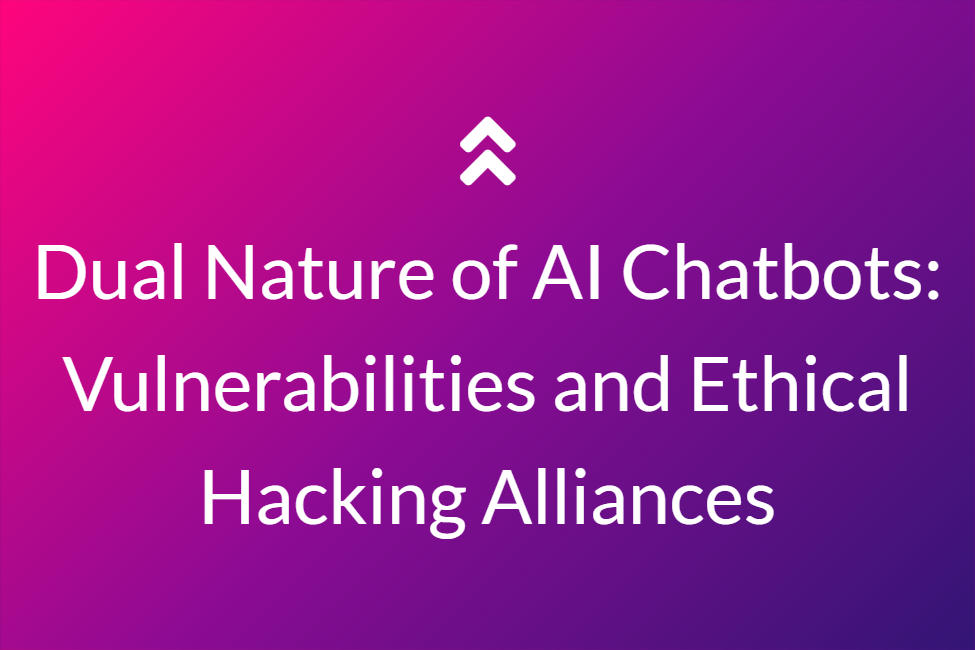Understanding the Dual Nature of AI Chatbots: Weaknesses and the Importance of Ethical Hacking Partnerships.
In the rapidly evolving landscape of AI chatbots, a dichotomy unfolds – from being convenient daily companions to becoming potential targets for cyber attacks. This article explores the vulnerabilities inherent in AI chatbots, delves into the possibilities of building ethical hacking tools using their capabilities, and outlines strategies to fortify defenses against data leaks.

Table of Contents
Identifying Vulnerabilities: Cracks in the AI Chatbots Armor
AI chatbots, despite their advanced algorithms, are not impervious to exploitation. Here, we uncover key vulnerabilities that hackers can exploit to compromise sensitive information:
Social Engineering Exploits
Hackers manipulate chatbots by exploiting programmed responses to extract confidential information. For instance, an attacker posing as a customer service representative could deceive a chatbot into revealing credit card details or employee login credentials.
Prompt Injection Attacks
This involves feeding chatbots malicious prompts disguised as natural language queries. Injecting hidden commands within a question might compel the chatbot to download malware onto the user’s device or activate unauthorized functionalities.
Data Poisoning
Malicious actors can manipulate training data to influence chatbot responses negatively. By injecting incorrect or biased information, they can potentially lead the chatbot to produce discriminatory or harmful outputs.
Crafting Tools with Bots: AI-Powered Ethical Hacking
Despite vulnerabilities, AI’s prowess in chatbots can be repurposed for ethical hacking, yielding powerful tools for cybersecurity:
AI in Vulnerability Detection
AI can analyze vast data sets to identify security flaws in software and systems with superhuman speed and accuracy, proactively mitigating potential exploits.
Phishing Detection Algorithms
AI algorithms can analyze email content to detect subtle language cues indicative of phishing scams, significantly improving phishing detection rates.
Social Engineering Defense with Chatbots
Programmed chatbots can recognize and counter social engineering tactics, engaging with attackers, alerting security teams, and gathering valuable intel simultaneously.
AI as an Investigative Ally: Enhancing Ethical Hacking Processes
Beyond dedicated tools, AI can directly assist ethical hackers in their investigative processes:
Data Analysis
AI analyzes log data, identifying anomalies and suspicious activity patterns, expediting the identification and investigation of potential security breaches.
Threat Intelligence Gathering
AI gathers and analyzes threat intelligence data, providing ethical hackers with a comprehensive picture of the current cyber landscape and emerging attack vectors.
Attack Simulation
AI simulates real-world cyberattacks, allowing ethical hackers to test the resilience of systems and identify potential weaknesses before attackers exploit them.
Data Security Fortification: Safeguarding Against Leaks
While AI aids ethical hacking, addressing associated risks, particularly data leaks, is paramount. Implement the following measures for robust data security:
Implementing Data Security Best Practices
This includes encryption, access control, and regular vulnerability assessments, creating a multi-layered defense against unauthorized data access.
Transparency and Trustworthiness
Ethical AI practitioners must prioritize transparency and explainability in their algorithms and tools, ensuring users understand how their data is used and how AI decisions are made.
Continuous Monitoring and Improvement
In the ever-evolving realm of cybersecurity, continuous monitoring for vulnerabilities and anomalies, coupled with regular updates and improvements, is essential for safeguarding data integrity.
In conclusion, the rise of AI chatbots introduces a captivating paradox. While their vulnerabilities pose a potential threat, embracing the technology’s opportunities empowers ethical hackers in the fight against cybercrime. By navigating the challenges and opportunities presented by AI, we pave the way for a more secure digital future.
Discover more from TechResider Submit AI Tool
Subscribe to get the latest posts sent to your email.
